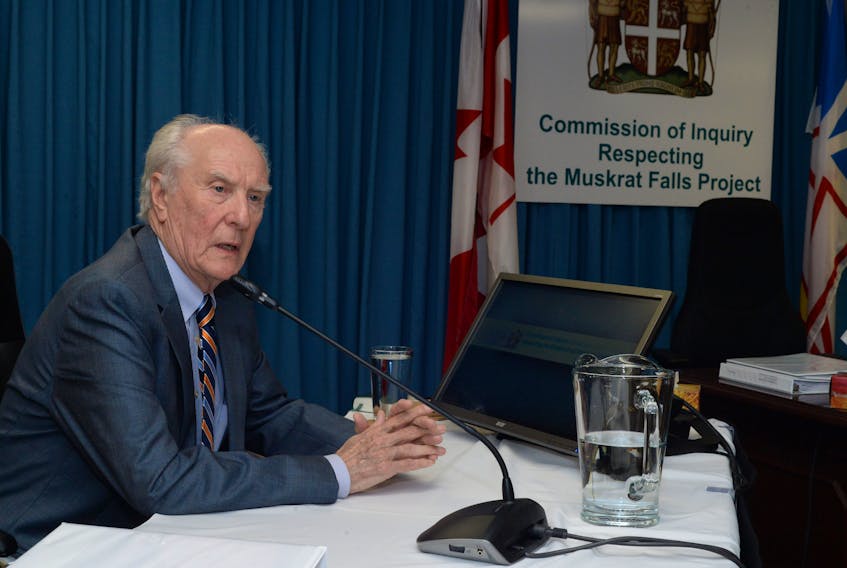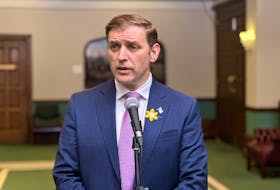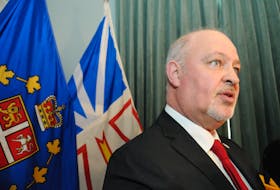The Muskrat Falls Inquiry has been spending time on conveyance of information: what was communicated in internal reviews before the hydro project’s final approval, and what was passed up the chain.
On Wednesday, former Newfoundland and Labrador Hydro vice-president and current board member John Mallam made waves, saying that when the estimated cost of the project was stated at $6.2 billion, he would have expected it to be more in the range of $7 billion to $8 billion, with added “float to the schedule.”
But consultant Derek Owen — the leader of the independent project review (IPR) team Mallam was part of — testified Thursday he did not recall Mallam expressing the same numbers and concern in 2012 to the project “gatekeeper,” then-Nalcor Energy president and CEO Ed Martin.
Owen said he does have a clear picture of Martin being surprised by the team’s criticism of the project schedule. Owen said the probability level, “P value,” used in its development was “extremely low”.
The IPR team’s report came more than three months before the project’s sanctioning on Dec. 17, 2012.
The team was tasked with looking at the internal approaches to the big questions on cost and schedule, but not saying what the estimated cost and schedule should actually be. And on the idea of a new “schedule reserve” and of more money potentially being identified for project overruns, their written report on Aug. 31, 2012 recommended only, “adequate provisions for management reserve and schedule reserve be included in the project sanction costs and schedules.”
“It is then the gatekeeper’s decision to do it or not do it,” Owen said on the stand. “That’s his prerogative.”
He was unsure what happened after the report was filed.
Earlier testimony from auditors at Grant Thornton suggested about $500 million in estimated “strategic risk” wasn’t included in the public estimate for the project.
On the stand, Owen suggested it could have been added as a “management reserve,” that Nalcor Energy could set aside basically an added contingency, and include that or not in the public estimate on the project.
Owen referenced his experience with oil projects, saying the management reserve was typically included in the bottom-line project estimate put forward for approval.
There has been suggestion from witnesses that making the reserve amount public leads contractors to try to squeeze more from contracts, but conflicting opinions on the point.
Owen could not say if the IPR team’s written report went up to the Nalcor Energy board of directors (apart from Martin), or to the provincial government.
He knows the report wasn’t part of a “decision support package” put together ahead of the project’s sanctioning, with only a reference to its completion.
Former Nalcor Energy board members — Tom Clift, Gerry Shortall, Ken Marshall and Terry Styles — testified they had not seen, or could not recall, a risk-analysis report from Westney Consulting. They were also asked about the IPR team report and the recommendation on having an additional management reserve and schedule reserve in the public estimates.
“I have no idea what number would have been presented to the government in terms of that,” said Styles, the chair of the board when Muskrat Falls was given the green light.
Shortall said he didn’t recall any independent consultant report criticizing the project numbers.
“I think that we tried to discuss risk and allow for contingencies in a way that would be consistent with best practice and reasonable practice for a project of this magnitude,” Clift said.
There was a series of questions Thursday on emails showing a Nalcor project lead, Paul Harrington, suggested changes to the IPR report, but also that the IPR team rejected those changes.
“I don’t know what his motivation was,” Owen said, noting the changes were not made.
He was asked if he thought the project team as a whole showed any “optimism bias” as they headed toward final approval of the hydro project.
“At the time we did the reviews, I don’t think so,” he said, adding if he were looking at it in hindsight, “very possibly” it could have been the case.
But he said he didn’t see that at the time.
RELATED STORIES:
Muskrat Falls schedule was ‘highly unlikely,’ cost overrun likely: consultant
Questions get personal at Muskrat Falls Inquiry
[email protected]
Twitter: TeleFitz









